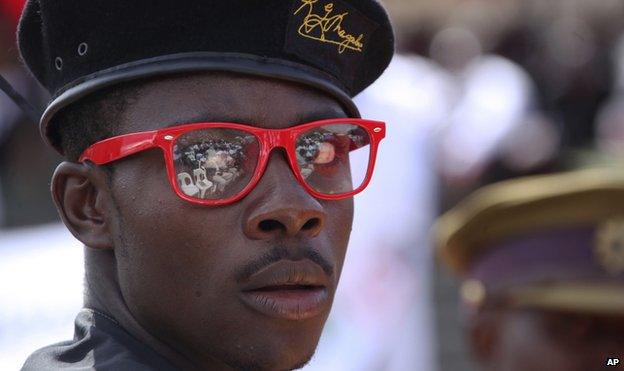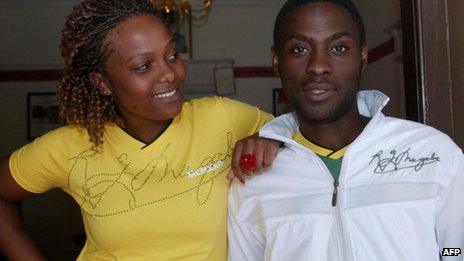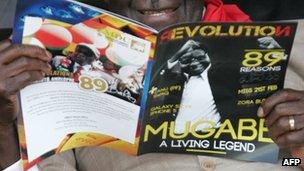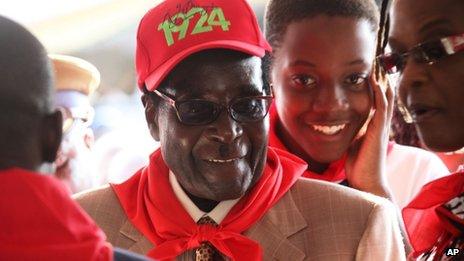Battle for the R G Mugabe fashion label
- Published

People with the signature R G Mugabe emblazoned over their fronts or atop a stylish beret can be seen proudly walking around Zimbabwe's capital - a city that is usually a hotbed of anti-Mugabe feeling.
Over the last three years, Zimbabwe's 89-year-old leader has become an unlikely fashion icon for the designer label House of Gushungo.
"This is the most valuable T-shirt I can wear," 28-year-old Liberty Mangwiro, resplendent in his black R G Mugabe top, tells me as he walks to his car in a smart business district of Harare.
"It represents the man who stands for what he believes in Africa."
But the firm behind the label is now at the centre of a dispute with President Robert Mugabe's own party, Zanu-PF, as the country heads towards Saturday's referendum on a new constitution and elections expected in July.
The party wants to make money from what it sees as a profitable scheme and Justice Minister Patrick Chinamasa is trying to patent the R G Mugabe signature.
"It's an intellectual property which we have to maintain. We have allowed every Jack and Jill to do what they like about the whole thing," Zanu-PF spokesman Rugare Gumbo tells the BBC, while President Mugabe in a suit and tie looks down on him from a portrait on his office wall.
"The main reason why the brand is so popular is that he is a highly intellectual leader," he says.
"But we want to control it to make sure whoever is going to use it will have to pay something. So we are going to restrict it as a party," he says.
Mugabe 'overwhelmed'
Sales have been slowly growing for Yedu Nesu, the company behind the House of Gushungo, though it is reluctant to discuss profits made so far.
T-shirts, costing between $10 (£6.50) and $15, umbrellas, berets and even sports clothes bearing the liberation leader's signature sold out at a stall in Gweru during the Zanu-PF conference in December.

Zanu-PF may see the label as a way to woo younger urban voters
Away from Zanu-PF events though, it is hard to find anywhere to buy the products as the company does not have an official outlet, although it says it is moving soon to a shop in central Harare.
Its most recent accessory is a cap with 1924 - the year of Mr Mugabe's birth - imprinted on it, which was released in time for the president's birthday celebrations last month.
Justin Matenda, Yedu Nesu's chief executive, says the Zanu-PF leader himself gave the blessing for the signature branding when asked - and has no shares in the venture.
"He was overwhelmed," said the 29-year-old businessman, who heads a three-man team.
They design and market the products and outsource the manufacturing.
"Yedu Nesu has the sole rights to market, distribute and manufacture the brand… the Robert Mugabe regalia," he said.
"The president does not want to make money," said Mr Matenda, explaining that the understanding was that once the fashion company began to make a profit, some of it would go a humanitarian cause.
Zanu-PF may see the label as a way to woo urban young trendy voters as it traditionally garners most of its support in rural areas.
Metropolitan hubs are the heartlands for the Movement for Democratic Change, whose leader Morgan Tsvangirai is set to challenge Mr Mugabe once more in this year's presidential election.

Robert Mugabe, born in 1924, recently celebrated his 89th birthday
Appealing to voters born after independence in 1980, when Mr Mugabe came to power, and who did not experience life under white-minority rule, is a challenge for Zanu-PF.
At the moment it is mainly middle-aged people who can be spotted in Harare sporting the R G Mugabe clothes line.
Mr Tsvangirai's spokesman Luke Tamborinyoka told the BBC that: "The Mugabe fashion craze is a desperate attempt by his brand managers to catch the young voters.
"It's an attempt to seduce the young, first-time voters who are believed to be almost a million - a very big number considering Zimbabwe's voting population."
But he said he did not think the designer clothes would make any difference to the way people vote.
"No amount of fashion labels will save him in the next election."
Versace, Polo... Mugabe?
Youth appeal is also the goal for House of Gushungo.
Saint Mahaka, the label's designer, gives an insight into their strategy.
"The young guys are into fashion. They talk about label, label, label... he [Mugabe] is already a brand himself.
"We decided, there is Versace, there is Polo, there is Tommy Hilfiger, people are putting on these labels, but don't know who they are and what the story is.
"We know President Mugabe's story, we know who he is.
"And those who resonate with his story and what he stands for - there is something only for the older guys but for the young guys as well."

Robert Mugabe is usually seen without a jacket and tie
Moses Donsa-Nkomo, who teaches intellectual property law at the University of Zimbabwe, says Yedu Nesu may risk a political backlash if it attempts to register the brand without permission from Zanu-PF.
The House of Gushungo team says their business is driven by a desire to ensure Mr Mugabe's legacy, not by avarice.
While many people accuse Mr Mugabe of wrecking what was once one of Africa's most diversified economies, his supporters argue that he is standing up for the rights of black Zimbabweans against the powers of colonialism - and the designer clothes are part of that battle.
"We all came from families that went through the liberation struggle," says Mr Matenda.
"Our upbringing has been mentored by the concept and principles of empowerment and upholding the ideals of black Zimbabweans," he said.
"We are just there to propel his identity, to maintain his legacy."